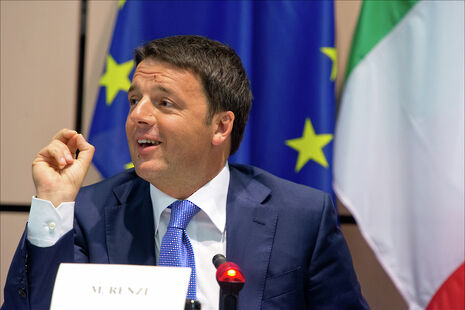Long Read: The Italian referendum could be the next ‘Brexit’ moment
With Italy’s PM Renzi promising to resign if the public rejects the constitutional reforms in today’s referendum, we should all worry about the fallout

On 4th December, Italy will be holding a referendum on constitutional reforms. As someone who lives in Italy, I am concerned for the future of the country, its political stability and its economic situation. But in a year which has seen two ‘shock’ outcomes – first with the Brexit referendum in the UK and, more recently, the election of Donald Trump as US president – this plebiscite may well have similarly far-reaching reverberations through our politics as we know it.
The constitutional reforms were initially proposed by Prime Minister Matteo Renzi, of the Democratic Party (PD), who set forth a constitutional bill in 2014 which failed to secure the two-thirds majority in both Houses required for the bill to be passed by Parliament. He must therefore put the matter to the public vote. The PM has staked his political future on this referendum, heralded as Italy’s own potential Brexit moment, having initially promised to resign if the ‘yes’ camp fails.
“Living in Italy, I’ve come to know full well how convoluted and protracted Italian bureaucracy can be”
The referendum is on constitutional reform. The Italian parliament is characterised by its ‘perfect bicameralism’, divided into the Chamber of Deputies and the Senate of the Republic. Currently, both Houses have equal powers and laws are thrown back and forth between the two before any legislation is passed, thus contributing to the lengthy bureaucracy for which Italy is famous and with which my family are constantly doing battle. Living in Italy, I’ve come to know full well how convoluted and protracted Italian bureaucracy can be. The frustration of many Italians and of those who live there – myself included – at the difficulty of simply getting anything done seems to be shared by Renzi himself in his proposal for constitutional reform.
One element of the proposed reform would end the power symmetry between the two Houses, with the Chamber of Deputies (the lower house) remaining the primary legislative body and the Senate (the upper house) seeing a reduction in its legislative powers. The Senate would therefore become a consultative body, rather than legislative, which would tip the balance of power in favour of the Chamber of Deputies. The number of MPs in the Senate would also be reduced from 315 to 100, thus streamlining the parliament and its efficiency.
I would greatly welcome this move: efficiency is something one encounters far too infrequently in Italy. The inefficiency of Italy’s parliamentary system appears to filter down into daily life, whether that be queueing 45 minutes for a stamp in the local post office, or my father requiring a Certificate of Life to prove his existence when, for no apparent reason, the Italian authorities declared him dead and ceased paying his pension.
The second point of the referendum regards the relationship between central and local governments and the centralisation of power. If the bill were to pass, the problem of overlapping responsibilities and duplication would be remedied due to the scrapping of ‘shared competencies’: individual policy areas would be the responsibility either of the local or the central government, and no longer of both.
The third prong of the proposed constitutional reforms concerns electoral law. The constitutional reform, combined with the recently-adopted ‘Italicum’ law, would mean the ruling government would see a disproportionate increase in power with regard to the opposition.
Attempts at constitutional reform in Italy are not unheard of, and quite rightly so, I would say. After all, according to the 5 Star Movement (M5S) member and Vice-President of the Chamber of Deputies Luigi di Maio, Italy has the largest and costliest parliament in the world. In 1993, the ‘Mattarellum’ was approved by a referendum: an electoral law reform, it introduced a system whereby 75 per cent of the votes were allocated according to the ‘first-past-the-post’ system, and the remaining 25 per cent according to proportional representation. As Prime Minister, in 2006 Silvio Berlusconi tried to pass constitutional reforms which ultimately failed, and in 2015 the ‘Italicum’ was introduced. An electoral law with the aim of achieving what previous reforms have failed to do, according to Renzi the ‘Italicum’ will improve government stability by producing a clear majority and a winner in the wake of elections.
“The referendum may well prove to be a vote on Renzi’s government, rather than on the constitutional reforms themselves”
According to a recent poll in the Italian newspaper La Stampa on the upcoming referendum, as of 10th November in the North the ‘yes’ camp is winning, while in the South (and Sicily in particular), the ‘no’ camp has a 10 per cent lead. Overall, however, recent polls are indicating the ‘no’ camp to have better chances of victory. As a member of the younger generation myself, I can sense young people’s desire for upheaval and renewal as a reaction to the economic crisis and unemployment. But, unfortunately, many have little faith in Renzi.
The referendum may well prove to be a vote on Renzi’s government, rather than on the constitutional reforms themselves – recent events in international politics have made us less likely to be shocked by an anti-establishment vote, after all. Despite the PM’s more recent reticence in trumpeting his resignation promises, I fear that some may vote against the referendum simply to bring about the ruling PM’s resignation.
If Renzi and the ‘yes’ camp do win the referendum, then governance and law-making in Italy may miraculously become easier. Since the birth of the Republic at the end of World War Two, Italy has had 63 governments in 70 years, many of which have been weak coalitions wracked by the instability of Italy’s political system. In my lifetime alone (a short 19 years) I have seen 11 governments and seven Prime Ministers. If Renzi’s constitutional reforms are approved, it may well be the end of the parliamentary gridlock which cripples Italian politics and so frustrates ordinary Italians.
But were Renzi to lose the referendum and the government to collapse, Italy would risk being plunged into political and economic disarray. From an economic point of view, a ‘no’ majority could send Italian bank shares into decline, push bond yields up, and lead to a weakening of the euro.

There is a chance that Renzi would not stand down in the face of defeat. However, the PM has said: “If the people say ‘No’ and they want that decrepit, unworkable system, I cannot be the person who negotiates a deal with other parties to create a little government or one with a limited goal [to change the electoral system]”.
In the case of Renzi’s resignation, the President of the Republic, Sergio Mattarella, may call early elections. The strong likelihood that the anti-establishment M5S, led by the comedian Beppe Grillo, may win and accede to power worries me. The M5S is largely composed of members with very little political experience. Their competence is dubious, as I have seen for myself in the disastrous start made by M5S member Virginia Raggi as mayor of Rome. Waste is littered across my city, as Raggi’s administration has thus far failed to renew the contract of the refuse collection agency; discontent at the M5S administration is riding high.
“I fear the possible repercussions of the M5S gaining power”
The populist M5S are not only inexperienced but they also hold certain ideas and policies which, if given the chance to implement them, may well prove disastrous for the country I consider home. Famous for the store they set by conspiracy theories, some M5S officials have suggested that the referendum is part of a capitalist plot hatched by the bank JP Morgan. But the M5S also holds some more serious, and therefore more worrying, views. The movement is famously Eurosceptic and anti-euro; if Renzi’s government were to collapse and the M5S (the ruling PD’s main opposition) were to win a general election, then Italy’s membership of the European Union and the eurozone may be thrown into doubt. Having already lived through a Brexit vote this year, I fear the possible repercussions of the M5S gaining power.
As Brexit and the recent US election have proved, predicting the outcome of a vote is not as straightforward as it may seem. Currently, the referendum is looking like more of a confidence vote on Renzi and his government than on Italy’s complex political system. Tonight, I will be sitting tight with bated breath: so much rides on the outcome of this referendum. Much of the Italian electorate has seemed undecided, and therefore so is the future of Prime Minister Renzi and, ultimately, Italy itself
 News / Right-wing billionaire Peter Thiel gives ‘antichrist’ lecture in Cambridge6 February 2026
News / Right-wing billionaire Peter Thiel gives ‘antichrist’ lecture in Cambridge6 February 2026 News / Cambridge students uncover possible execution pit9 February 2026
News / Cambridge students uncover possible execution pit9 February 2026 News / Epstein contacted Cambridge academics about research funding6 February 2026
News / Epstein contacted Cambridge academics about research funding6 February 2026 News / Man pleads guility to arson at Catz8 February 2026
News / Man pleads guility to arson at Catz8 February 2026 News / John’s duped into £10m overspend6 February 2026
News / John’s duped into £10m overspend6 February 2026









